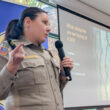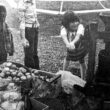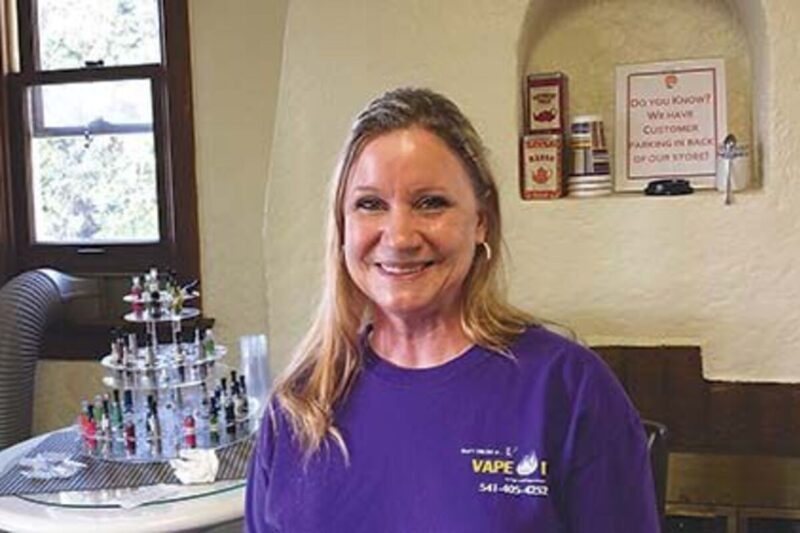Audrey Gomez
Dawn Dennis, 50, remembers the date she was diagnosed with breast cancer: Jan. 22, 2014.
She and her fiance, Tim Primasing, were driving to her grandson’s basketball game when she got the call.
She had been diagnosed previously with cervical cancer and had a hysterectomy. Because of that, she was taking estrogen. And she still smoked cigarettes.
“I was just one of the people who thought it wouldn’t happen to me and it did,” Dennis said. “They kept telling me my chances were higher if I smoked but I wouldn’t listen.”
She had noticed a pain in her breast the year and half before, when she was 48, but mammograms were not covered by her insurance, she said.
When she finally did get a mammogram, that was followed by an ultrasound and a biopsy.
“That’s what’s weird about it, because people always say it’s not supposed to be painful, but for me, it was,” Dennis said.
Dennis opted to have a double mastectomy because the cancer was invasive.
“Until we did the double mastectomy, I didn’t know if it had gone into my lymph nodes and whether I would have to have chemo or radiation or any of that,” Dennis said.
She does have to take medication for 10 years, she said.
One of the issues Dennis and one of her friends from high school, who also is battling cancer, have talked about is the emphasis on breast cancer awareness rather than on a breast cancer cure.
The medication Dennis has to take makes her extremely nauseous and causes pain in her joints.
“I don’t know, men don’t have to take these pills so we’re thinking, you know, it’s making me extremely ill, but it’s like they don’t believe you when you go in there and try to tell them,” Dennis said. “I finally got a female oncologist that really cared and understood, so I’m hopefully going to take a different chemo pill than the one I’m taking right now.”
She decided to stop taking that pill for now, though it means the chances of her cancer coming back are higher.
“It makes you really sick, so you have to decide whether you’re going to do that or not,” Dennis said.
Another obstacle she faced is how to pay for all the surgeries. Samaritan did eventually give her a grant.
“If someone had not told me to apply for that, I would not have known,” Dennis said.
Financial assistance information is available through Samaritan Health Services Bill Pay and Financial Services. The application process isn’t difficult, she said.
Dennis had more difficulty with paying for her schooling.
She was 10 credits shy of finishing her business degree at Oregon State University when she was diagnosed, she said. At that point, she had to quit school and she lost a $30,000 scholarship.
She had enrolled at OSU after a car accident. Before that, she had been in banking for 20 years.
She is making regular payments but still owes about $2,500, she said.
“Hopefully, I will finish my degree,” Dennis said. “That is my intention.”
Though she needed to take a break from college, she still needed something to do, she said.
“I didn’t have an income, so I opened (Vape-It) with some money I had in a savings account,” Dennis said.
“Yup, she had to have something to do,” Primasing said with a laugh. “I said, ‘Oh my G–, you have cancer and you want to open a store?’ That should be interesting.”
Their home is in the back of the shop, so they are able to live there and work out of their home.
“Tim and I run the shop together and Tim has been a help to me,” Dennis said. “He stood behind me with all of this and has been supportive.”
Dennis and Primasing have been together for three years.
“We got engaged the same day I had the mastectomy,” Dennis said. “He asked me to marry him that day.”
“I dropped on one knee in the kitchen,” Primasing said.
“Maybe that was his way of being supportive of me about it,” Dennis said.
Dennis has been through several surgeries and said she had staph infections and also had trouble healing. Her healing improved, she said, when she stopped smoking.
Her son Kyle and daughter-in-law Lorayne inspired her to quit cigarettes.
Now she hopes to do the same for others.
“I’m here to help people quit smoking,” she said. “That’s why I’m here.”
Primasing smoked and chewed tobacco for 35 years before switching to vaping.
Dennis is cancer-free and said she is feeling better.
“I don’t feel the greatest, but I just keep plugging along,” she said.





